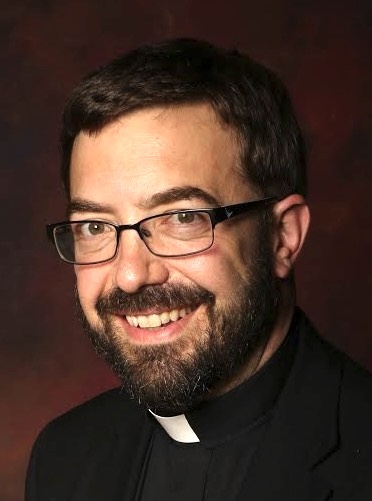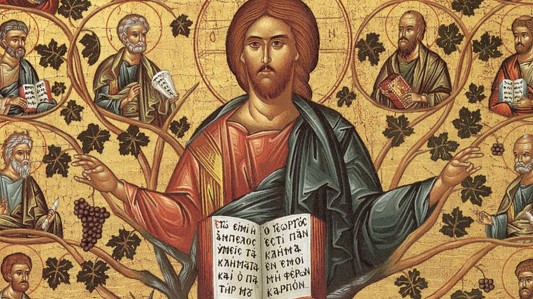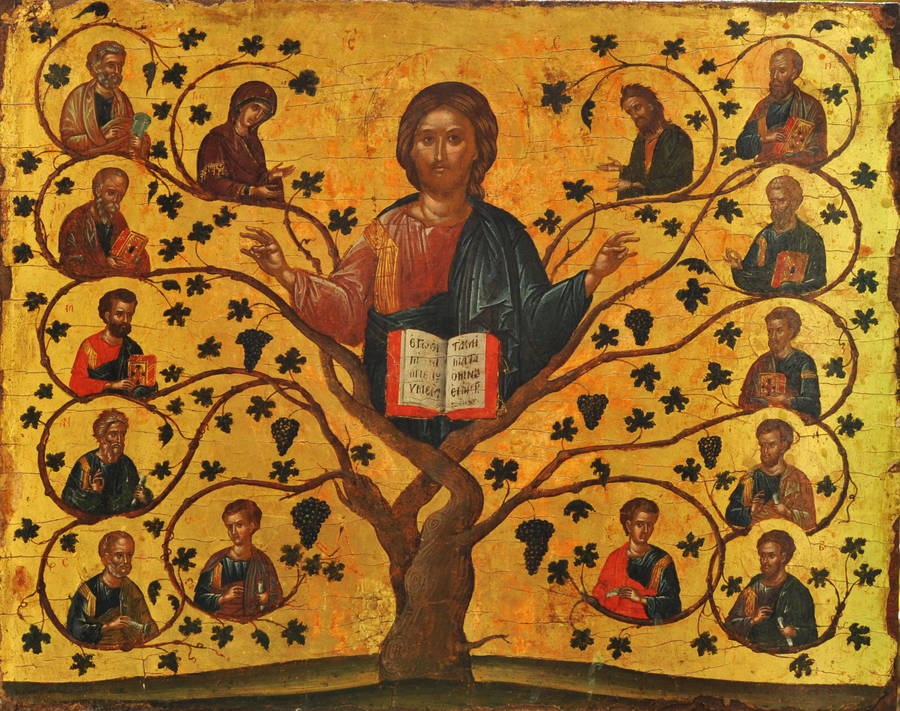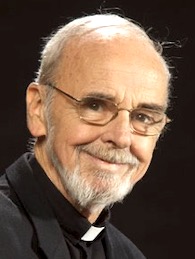Fr. Andrew Ricci
5th Sunday of Easter B
Connected to Christ We Reach Out to Others
Christ is the vine; we are the branches. Drawing strength from the Lord we flourish and grow, fruitfully sharing the grace we have received with the people in our lives.
Fr. Austin Fleming
5th Sunday of Easter B

Only Connect
Homiletic Pastoral Review
5th Sunday of Easter B
Basilica of the National Shrine
5th Sunday of Easter B
Dominican Blackfriars
5th Sunday of Easter B
Bishop Robert Barron
5th Sunday of Easter B
5th Sunday of Easter B
Church as Common-union
The Church is not something that we allow to enter into us so that it belongs to us. The Church is that common-union into which we humbly enter in response to God’s call in response to God’s invitation to us. The Church is that common-union into which we surrender our individual autonomy over into the care of God so that He can manage us and thus, through us, reach out into our world to reshape it, to reform it, and to redeem it.
Fr. Joe Jagodensky, SDS
5th Sunday of Easter B
The Vine and the Branches
What happens in family conversations is a slow “pruning” as Jesus would call it. The hurts of a child could be softened, the bad grade could be redeemed the next time around and a sibling’s upcoming event could be anticipated together. Our family was reminded through the exchange of food what unity and oneness could look like. Just like our present society, it did not always work but the image of what it could be was staring at us each time we entered the kitchen. That family kitchen table.
5th Sunday of Easter B
Fr. George Smiga
5th Sunday of Easter B
Pruning the Dead Away
Today’s gospel is not about plants. It’s about people. It is not about vines. It’s about life. The image of the vine and the branches which Jesus uses in this gospel is a way of saying that we as branches will share in Christ’s very life, the life of the vine. If we abide in him, we will have life to the fullest. Now this is a very positive and exciting image, and yet there is one line in today’s gospel that can stop us short and perhaps even frighten us. The line is this: “The branches that bear fruit my father will prune so that they bear more fruit.” That line tells us that we who are disciples of Christ must expect to be pruned by God, that something which belongs to us might indeed be cut off or taken away. This can frighten us, because as much as we want life, as much as we desire to abide in Christ, we do not want to lose anything that belongs to us. We do not want something which is ours to be cut off. Yet, it is central to the teaching of Jesus that this kind of pruning is at times necessary.
5th Sunday of Easter (Year B) Homilies
The Life Within Us
Goodness Is Its Own Reward
Beyond Asking
Son of Encouragement
The Small Matter of Pruning
Fr. Anthony Ekpunobi, C.M.
5th Sunday of Easter B
Msgr. Joseph Pellegrino
5th Sunday of Easter B
The Vines and the Branches

The Gospel speaks about bearing fruit. If the branch is united to the vine, it bears much fruit. God calls us to make His message real in the world. He calls us to bring His Love to the world. He is not calling us just to be in His presence. He is calling us to use His Presence to transform the world. Husbands and wives, parents and children, neighbors and friends, priests and laity, are called to live the only Life that matters so completely that others are attracted to that Life, within the home, within the
neighborhood and within the world. The Life of Christ is indeed a magnet. When people experience this Life in others they want it for themselves. These people, those who turn to God, are fruit. Our union with God draws them to God. They are the fruit we have been called to bear.
Msgr. Charles Pope
5th Sunday of Easter B
On this fifth Sunday of Easter, the Lord presents us with four basic principles that assist us in being better, more fruitful disciples.
1. The Purpose of Disciples
2. The Pruning of Disciples
3. Persistence of Disciples
4. The Produce of Disciples
Bishop John Louis
5th Sunday of Easter B
Fr. Michael Chua
5th Sunday of Easter B
Life Issues
5th Sunday of Easter B
Remaining in God’s Love
Antonio P. Pueyo
Either God exists or does not exist. If God exists, we certainly have to abide by His commandments. If God does not exist, then everything is permissible. Some post-moderns prefer to set aside the reality of God so that they can make their own rules.
Let Us Show, Through Our Actions, That We Are True Christians
Frank Enderle
If we follow Christ faithfully, we will not only say so in words we will also show with our actions that we are His sisters and brothers, daughters and sons of God the Father. When we were baptized, we Christians acquired the right and the power to be part of the vine that is the Lord. Through faith, prayer in community, the liturgy, and the word, we encounter a new life that will help us to become more united to Christ and His Church.
It’s Always Pruning Season
Proclaim Sermons
Using metaphorical language, Jesus describes himself as the true vine and God as the vine dresser. And he insists that his followers stay connected to the vine so they can produce good fruit. What this requires is pruning away whatever gets in the way of that vital task.
Threat or Promise? (Easter 5)
Proclaim Sermons
In this passage, Jesus defines the disciples’ — and our — primary responsibility: to abide in him. Any bearing fruit or taking action on our part must be a direct result of our first abiding in him.
SOURCE: LifeIssues.net Homily Archive
Fr. Phil Bloom
5th Sunday of Easter B
Boldly in the Name of the Lord
Bottom line: Ask God to help you understand what you really want. And it will be done for you. Ask boldly. And like St. Paul, act boldly in the name of the Lord.
RELATED HOMILIES:
2015: Disciple Makers Week 5: All We Can Ask
2012: Boldly in the Name of the Lord
2009: Because We Keep His Commandments
2006: Dependence and Freedom
2003: Ask Whatever You Want
2000: Fatima Prophecies & the Vine Dresser
5th Sunday of Easter B
Bear Fruit – Our Love is not to be just words or mere talk
Are we bearing fruit for the kingdom of God? Is our Christian love real and active, something that inspires others, or is it just words and mere talk? Last weekend (2003) I was speaking with someone who works in a Catholic high school in England. He was reared an Anglican but decided to become a Catholic after getting the job in the Catholic school. I asked him what made him decide to become a Catholic. He said it was the quality of life lived by the faculty and staff in the school. The way they live their lives impressed him so much that he decided to become Catholic also.
Fr. John Kavanaugh, S.J.
5th Sunday of Easter B
Radical Faith
The reception of Communion makes no sense if we do not intend it to affirm that Christ is our personal savior. What could be more personal, more intense, than to say, “You are my food and drink, you are my own very flesh and blood”?
In our approach to the altar, our coming forward to receive the body and blood of Christ, we sacramentally embody Billy Graham’s procession of witnesses. When we acknowledge that Christ is our way, truth, and life, our savior and redeemer, our sustenance, we are united not only with our fellow believers who do not share our communion, but also with Paul, so wholly given to the mystery of his ransom by Christ, and with the school of John, sustained by the belief that God is in them and Christ’s Spirit is with them.
Bishop Frank Schuster
5th Sunday of Easter B
The Benefits of Spiritual Pruning

The Gospel reading this weekend is a bit unsettling. Jesus says that he is the vine and we are the branches. So far so good, that seems rather comforting. Then Jesus suggests that God is like a gardener who prunes us so that we will bear more fruit. That doesn’t sound very nice at all, does it? I mean, think about it, pruning is a violent action. Pruning, after all, involves taking a knife, a clipper or a saw to a plant, sometimes cutting it down without killing it, so that the plant may grow to greater splendor. This is an uncomfortable analogy because, well, pruning sounds very painful. Who here wants to be pruned, raise your hand?
5th Sunday of Easter B










 The Dominican Friars in Britain
The Dominican Friars in Britain 






















 Homilies of Bishop John Louis
Homilies of Bishop John Louis 










